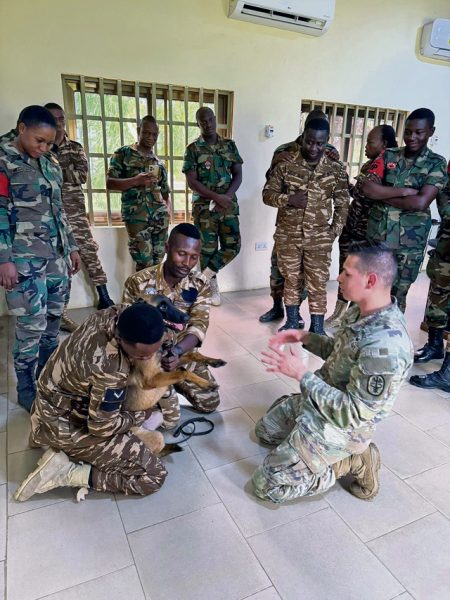
From 8 May to 31 May a veterinarian and an animal care specialist from Public Health Command Europe supported a three week-long medical readiness exercise in Accra, Ghana.
MEDREX is a program designed and overseen by the U.S. Southern European Task Force, Africa that allows medical personnel from the U.S. military and partner nations to exchange medical procedures and strengthen treatment capabilities. The exercise exposes participants to unique medical delivery methods and ultimately improves their capacity to assess and deliver care.
For the first time in its history, a veterinary component was added to the medical exercise to provide veterinary care and train handlers on military working dog point of care training.
“My role at the MEDREX was to be the lead for the veterinary team. We executed training, patient care and facilitated interoperability between the United States and Ghanian Militaries,” said Capt. Javier Pino, veterinarian at the Spangdahlem Veterinary Treatment Facility.
During the exercise, Pino and animal care technician Sgt. Ricardo Blancarte trained more than 75 Ghanian military partners, handlers and veterinary staff on Canine Tactical Combative Casualty Care, canine first-aid, bandaging, intravenous access, common injuries in MWDs and ultrasound training at the military veterinary clinic and Ghana National Dog Academy.

According to Blancarte, the different training levels of the handlers were challenging at first but provided a great opportunity to learn from each other.
“For me it was almost like a deployment-like setting, resources and equipment were limited but the Ghanian partners showed me how to utilize the resources that were available and still provide enhanced care to military working dogs,” said Blancarte. “From our standpoint we were able to teach them more of the theoretical approaches which was very rewarding since they continued to ask questions and were eager to learn more.”
Pino and his team recommend that a veterinary team becomes an integral part of the exercise in the future to exchange information and knowledge between the United States and the Ghanian militaries regarding Military Working Dog, veterinary care and animal husbandry.
“The main takeaway from the MEDREX was how important is it for the Veterinary Corps to be involved in these types of exercises. We provide a unique capability that cannot be provided without us,” said Pino. “Through the training and support we provided in Ghana we set the foundation for an improved Military Working Dog program in Ghana and opened the door for future collaborations between the U.S. Army Veterinary Corps, the U.S. Air Force, the North Dakota National Guard and the Ghanian Armed Forces.”


